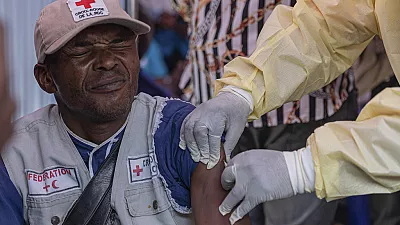WHO says almost a million mpox vaccines have been allocated to Africa
3 min read
The World Health Organization (WHO) announced on Friday that nearly one million doses of mpox vaccines have been allocated to nine African countries. This allocation follows the establishment of an Access and Allocation Mechanism (AAM) aimed at ensuring equitable and timely access to mpox vaccines across the continent.
Dr. Tedros Adhanom Ghebreyesus, WHO Director-General, highlighted that over 50,000 individuals have already been vaccinated against mpox in the Democratic Republic of the Congo and Rwanda, thanks to generous donations from the United States and the European Commission. This initiative underscores a coordinated international effort to combat the mpox outbreak.
The timing of this announcement is critical, as the Africa Centres for Disease Control and Prevention (Africa CDC) reported a staggering 500 percent increase in mpox cases compared to last year, now affecting 19 countries across the continent. This sharp rise in cases has raised alarms about the potential spread of the virus and the urgent need for vaccination and other public health measures.
The WHO declared mpox a global health emergency in mid-August after a new strain, clade 1b, began to spread from the Democratic Republic of the Congo to neighboring countries. This declaration emphasizes the severity of the outbreak and the necessity for immediate action to control it.
Dr. Ghebreyesus explained that the allocation of approximately 900,000 vaccine doses was determined based on public health needs, particularly in regions experiencing significant transmission of the new variant. This initial allocation is part of a larger plan that anticipates the availability of almost six million vaccine doses by the end of 2024.
“This is an important step towards bringing the mpox outbreaks under control, as part of WHO and the Africa CDC’s shared strategic response plan,” Dr. Ghebreyesus stated. However, he emphasized that vaccination is just one component of a comprehensive approach needed to tackle the outbreak effectively.
Alongside vaccination, the WHO stresses the importance of other public health measures such as case finding, contact tracing, infection prevention and control, clinical care, risk communication, and testing. These strategies are crucial in not only managing current cases but also in preventing future outbreaks.
The allocation of mpox vaccines represents a significant move towards strengthening Africa’s response to infectious diseases, particularly in light of the ongoing challenges posed by outbreaks. The WHO and Africa CDC are working closely with member states to implement strategies that can effectively contain the spread of mpox.
As countries prepare to receive and distribute the allocated vaccines, health officials are urged to prioritize vulnerable populations and those most at risk of infection. Targeted vaccination campaigns can play a crucial role in curbing the spread of the virus and protecting public health.
The global response to mpox illustrates the importance of international cooperation in addressing health emergencies. As countries navigate the complexities of vaccine distribution and administration, the support from organizations like the WHO and contributions from donor nations will be vital in ensuring that resources reach those in need.
With mpox cases on the rise and the emergence of new variants, the focus on preventive measures and vaccination cannot be overstated. Communities must be educated about the virus, its transmission, and the protective measures available to them.
Looking ahead, the WHO’s efforts to allocate vaccines and provide support to African nations reflect a commitment to addressing health disparities and promoting equitable access to lifesaving interventions. By prioritizing areas with the highest transmission rates, the WHO aims to mitigate the impact of mpox and safeguard the health of populations across the continent.
In conclusion, the WHO’s allocation of nearly one million mpox vaccines to African countries marks a significant step in combating the rising outbreak. As public health officials implement vaccination campaigns alongside comprehensive health strategies, there is hope for controlling the spread of mpox and improving health outcomes in affected regions. The collaborative efforts of international organizations, governments, and communities will be essential in navigating this public health challenge.






